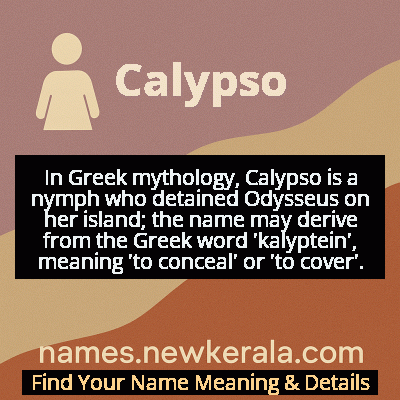Calypso Name Meaning & Details
Origin, Popularity, Numerology Analysis & Name Meaning of Calypso
Discover the origin, meaning, and cultural significance of the name CALYPSO. Delve into its historical roots and explore the lasting impact it has had on communities and traditions.
Name
Calypso
Gender
Female
Origin
Greek
Lucky Number
1
Meaning of the Name - Calypso
In Greek mythology, Calypso is a nymph who detained Odysseus on her island; the name may derive from the Greek word 'kalyptein', meaning 'to conceal' or 'to cover'.
Calypso - Complete Numerology Analysis
Your Numerology Number
Based on Pythagorean Numerology System
Ruling Planet
Sun
Positive Nature
Leaders, ambitious, highly driven, self-reliant, innovative.
Negative Traits
Overly aggressive, domineering, impatient, selfish.
Lucky Colours
Red, orange, gold.
Lucky Days
Sunday.
Lucky Stones
Ruby, garnet.
Harmony Numbers
2, 3, 9.
Best Suited Professions
Entrepreneurs, managers, engineers.
What People Like About You
Courage, determination, leadership.
Famous People Named Calypso
Calypso (Mythological)
Nymph/Goddess
Central figure in Homer's Odyssey who detained Odysseus for seven years
Calypso Rose
Calypso Musician
Pioneering female calypso artist and cultural ambassador
Calypso Valois
Fictional Character
Strong female aviation character in Tintin comics
Name Variations & International Equivalents
Click on blue names to explore their detailed meanings. Gray names with will be available soon.
Cultural & Historical Significance
Beyond classical mythology, the name experienced a fascinating cultural migration when it became associated with Caribbean calypso music in the 20th century. Though etymologically unrelated to the Greek name, this musical connection added layers of cultural meaning, associating the name with rhythm, social commentary, and African diaspora traditions. In modern times, Calypso has become a symbol of feminine power, environmental consciousness (through Jacques Cousteau's research vessel), and artistic freedom. The name continues to evolve, representing both ancient wisdom and contemporary creativity across multiple cultural contexts.
Extended Personality Analysis
People named Calypso are often characterized by their intense magnetism and emotional depth. They possess a natural allure that draws others to them, combined with a strong sense of independence and self-possession. Like the mythological figure, they may exhibit a nurturing yet possessive quality in relationships, valuing deep connections while maintaining their autonomy. Their personalities typically blend creativity with intuition, often expressing themselves through artistic or musical pursuits. They tend to be perceptive and insightful, with an ability to understand hidden motivations and emotional undercurrents.
On the challenging side, Calypsos may struggle with tendencies toward jealousy or the desire to control situations and relationships. Their strong will and determination can sometimes manifest as stubbornness, and their emotional intensity might overwhelm more reserved personalities. However, these same qualities make them fiercely loyal friends and passionate advocates for causes they believe in. They often possess a deep connection to nature, particularly water elements, and may find solace and inspiration in natural environments. Their complexity makes them fascinating individuals who continually reveal new layers to those who take the time to know them deeply.
Modern Usage & Popularity
In contemporary naming practices, Calypso has emerged as a distinctive choice for parents seeking mythological names with strong character and international appeal. While still relatively uncommon, its usage has shown consistent growth since the late 20th century, particularly following cultural exposures like the Pirates of the Caribbean film franchise and the continued popularity of Greek mythology in literature and media. The name currently ranks outside the top 1000 in the United States but maintains a steady presence, with approximately 50-100 girls receiving the name annually in recent years. Its appeal crosses cultural boundaries, finding popularity among families of Greek heritage, mythology enthusiasts, and parents drawn to ocean-themed names. The name's musical connections through calypso music add an additional layer of cultural richness, making it particularly appealing in creative and artistic communities. Modern usage often focuses on the name's positive associations with freedom, nature, and feminine power rather than the more problematic aspects of the mythological narrative.
Symbolic & Spiritual Meanings
Symbolically, Calypso embodies profound dualities and transformative power. The name's literal meaning 'to conceal' or 'to hide' suggests hidden knowledge, mysteries waiting to be revealed, and the transformative potential of isolation and introspection. Like the ocean depths she rules in mythology, Calypso represents the unconscious mind, emotional depths, and secrets that shape human experience. Her mythological role as both captor and caretaker symbolizes the complex nature of love and desire—how the things we most cherish can also become prisons if held too tightly.
The island Ogygia serves as a powerful symbol of both paradise and confinement, representing the human longing for perfect happiness and the realization that such stasis can become its own form of imprisonment. This makes Calypso a rich symbol for artistic creation, where the isolation necessary for deep work can feel both liberating and restrictive. In broader metaphorical terms, she represents the feminine principle of containment and revelation, the power of nature both to nurture and to overwhelm, and the eternal human struggle between the desire for security and the need for freedom. Her story reminds us that true growth often requires leaving behind what we love to pursue what we must become.

